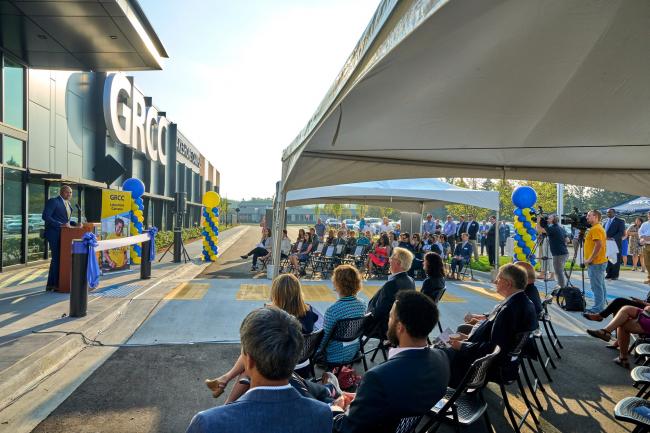August 19, 2021, GRAND RAPIDS, Mich. – Community leaders say the new GRCC Lakeshore Campus’ affordability and accessibility will remove obstacles to residents gaining a quality college education and help employers gain talented people to boost the growing region’s economy.
Grand Rapids Community College celebrated the opening of the new campus on Thursday with a ribbon-cutting ceremony with plans for a community open house from 10 a.m. to 1 p.m. on Saturday, Aug. 21.
The college transformed a shuttered JCPenney in The Shops at Westshore mall, 12335 James Street, into a consolidated campus for students of all ages seeking both degrees and career certificates.
GRCC President Bill Pink said the new campus reflects a commitment to Lakeshore residents, providing and educational pathway to success that benefits students, but also the entire region.
“This is a community effort. Community college is about community,” he said. “The work we do goes well beyond the work that will happen in classrooms and labs. It goes to the outreach we’ll have in this community. It goes to opportunities to host events in this building. It goes to opportunities for our staff and our faculty to reach out to this community in ways that you’ve never seen before. That’s the work of a community college.”
The campus is located on a Macatawa Area Express bus line, and students can complete many programs without needing to go to the downtown Grand Rapids campus.
Lakeshore Advantage President Jennifer Owens noted recent census figures showing Ottawa County had the largest population increase in the state, with Allegan County close behind. But college completion rates lag behind, and that makes it more challenging for employers to grow and create jobs.
“There are so many innovative companies in this community offering challenging and financially rewarding job opportunities,” she said. “However, the skills needed for these jobs increasingly require some level of postsecondary education such as degree seeking programs, apprenticeships or technical skills training.”
She said the GRCC Lakeshore Campus brings education closer to home for the students in the area who need it most.
“Thank you to GRCC for your investment in this Lakeshore campus,” she said. “And more importantly, for your investment in the long-term economic health and vitality of our entire lakeshore community.”
As president of the Michigan West Coast Chamber, Jane Clark represents 1,100 firms with 64,000 employees in the Holland and Zeeland area. She said students can gain in-demand skills leading to rewarding careers.
“When we are talking to our member firms, all we are hearing about these days is talent,” she said. “Talent is the most critical issue they are facing. We need this facility so we have affordable, attainable education available for everybody in this community. You are going to help us skill our young people coming into the workforce and upskill the existing workers, and it is so needed.”
Attorney and school board member Randy Schipper is a Grand Rapids Junior College graduate, and said the college’s affordability allowed him to build a quality educational foundation without debt. He’s advocated for Lakeshore students to have the same opportunities.
“GRCC is not a second-rate education. It’s first-rate,” he said. “People in our community should be proud to have this opportunity and take advantage of it.”
GRCC has offered classes on the Lakeshore, spread out in four locations, for more than 20 years. The new Lakeshore Campus consolidates resources and programs in the heart of Holland Township with access to public transportation, employers and services.
The 52,000-square-foot facility has nine classrooms, four computer labs and five unique labs for biology, chemistry, electronics, automation, welding and machine tooling, housing programs for students working toward an associate degree or a career-focused certificate.
The $12 million project also has spaces for advising and counseling and other student support services and a satellite library, as well as areas for use by community groups.
